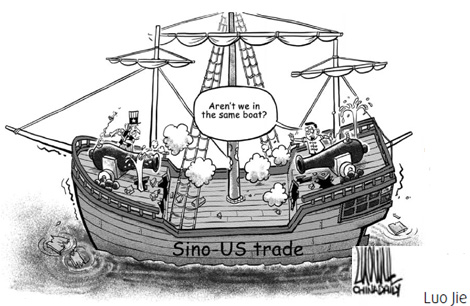
|
BIZCHINA> Review & Analysis
 |
|
Debate: Trade wars
(China Daily)
Updated: 2009-10-20 10:06
 Editor: The visit of US President Barack Obama to China next month assumes special significance because of the trade disputes between the two countries. He Maochun, professor in Tsinghua University, tells China Daily's Lan Lan how governments and industrial associations can help avoid such disputes, while a leading bank's analyst writes how China is likely to react to fresh tariffs on its steel pipes. Give reason a chance andindulge in fair practice
The Barack Obama administration is testing the strength of China's economy by imposing unjustifiably high tariffs on its products, reflecting the immaturity of its trade policy. Given the current state of affairs in the United States, Sino-American trade disputes are likely to intensify. But, says He Maochun, professor in the Institute of International Studies of Tsinghua University, Obama should think twice before upsetting the deeply intertwined bilateral interests further. Last month, Obama imposed tariffs of up to 35 percent on China-made tires. Later, the US government announced that an anti-dumping investigation could increase the duty on made-in-China steel pipes to as much as 98 percent. Such high duty will price Chinese producers, who export labor-intensive goods with low profit margins (an average of about 5 percent), out of the market, He says. Indeed, Obama is facing a number of challenges at home, including the unemployment crisis and resistance to his healthcare reform plan. So he wants to get the support of the voters that workers' unions represent and, after weighing the pros and cons, has chosen to placate the unions. To put it simply, Obama has made a bad start on the Sino-US trade front by ignoring the reaction of a major trading partner like China. This will only help increase Sino-US trade conflicts, for more American interest groups will seek similar protection from their president. The result: the US administration could target more Chinese enterprises, forcing them to cut jobs. There is also the fear that other countries would start following the US example, giving rise to trade disputes not only on anti-dumping and anti-subsidy tariffs but also in areas such as anti-monopoly and intellectual property rights protection. China has responded to the excessive and unjustified tariffs by filing a complaint with the World Trade Organization (WTO), saying it could impose duty on poultry products and auto parts imported from the US. Nevertheless, China has always tried to avoid trade disputes with the US, or for that matter any other country. The reason for that is simple: Such disputes hurt both sides. Despite the trade conflicts, Sino-US ties are at an all time high, He says. And though occasional disputes and lawsuits are normal in trade partnerships, Obama should ensure that cases like the tariff conflict do not recur. If they do, the US president can be seen as leading bilateral ties along the wrong course. As the world's biggest creditor and an important destination for US investment, China holds the bargaining chips in the trade disputes. The US needs China's support in talks with the Democratic People's Republic of Korea and Iran on nuclear issues, too. China is a rapidly rising economy and an vital player on the global stage, which makes it very important for the US foreign policy. Hence, Obama can be expected to shift to more pragmatic economic policies toward China. He can do so by first preventing the trade war from escalating by stressing the interdependence of the two countries. Besides, Obama's trade policies toward China are important for Beijing, too. And to achieve an ideal Sino-US trade relationship, Beijing is striving for two things: for Washington to recognize it as a market economy and lift the restrictions imposed on export of hi-tech goods to China. China and the US are in the same boat when it comes to matters of the economy. And sailors on a boat have to work for mutual benefits to prevent it from sinking and sailing ahead. The next vital question, He says, is how Chinese exporters can avoid frequent anti-dumping allegations and surveys in the US, the European Union states and other countries. China should rethink its position in the world market and act like a trustworthy global leader, shouldering more responsibilities. It has replaced Germany as the world's largest exporter and could overtake the US as the world's largest importer in the next few years. The Chinese government is trying to boost domestic demand, and succeeding in its efforts, to shift its reliance on exports for economic growth. This has made imports a driving force of its economy. Many international experts no longer consider China as a developing country. Hence, China should impose stricter demands on itself to abide by WTO agreements and rules, without citing the excuse of still being in a transitional period, He says. In terms of WTO rules, more work needs to be done. For instance, there's plenty of room for China to improve the quality and certification system of it products and enhance their market transparency. In this regard, industrial associations representing Chinese exporters' interests have to play a bigger role than they have done so far. Thousands of small businesses across the country have to do everything possible to avoid trade conflicts because they cannot afford to pay the exorbitant legal fees for hearings on global trade disputes and it's very difficult for them to negotiate with related global associates.
So it is important that Chinese enterprises are allowed to elect their own industrial associations, associations that can really serve them and take more effective actions. Plus, the industrial associations have to establish a mechanism to ensure long-term dialogues with overseas unions to avoid trade disputes. They should study the competitiveness and other factors of a market that Chinese exporters want to enter, and be able to forecast to what extent imports can grow. (For more biz stories, please visit Industries)
|